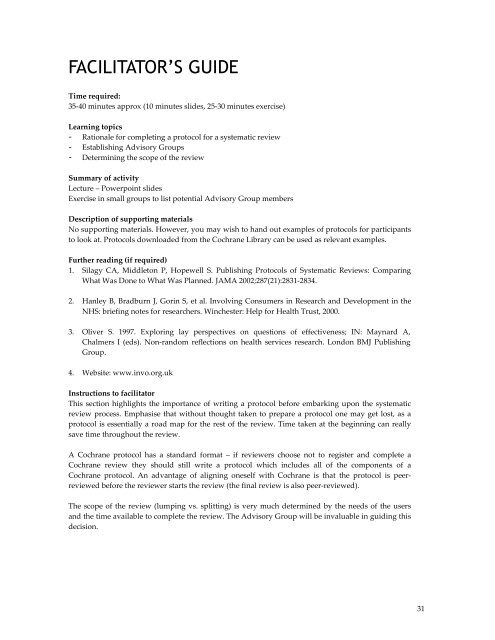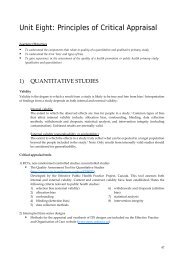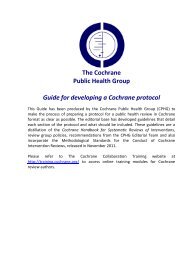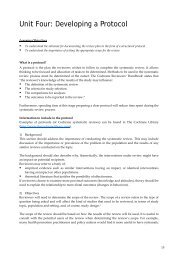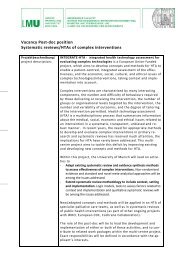Train the Trainer Course book - Cochrane Public Health Group
Train the Trainer Course book - Cochrane Public Health Group
Train the Trainer Course book - Cochrane Public Health Group
You also want an ePaper? Increase the reach of your titles
YUMPU automatically turns print PDFs into web optimized ePapers that Google loves.
FACILITATOR’S GUIDE<br />
Time required:<br />
35-40 minutes approx (10 minutes slides, 25-30 minutes exercise)<br />
Learning topics<br />
- Rationale for completing a protocol for a systematic review<br />
- Establishing Advisory <strong>Group</strong>s<br />
- Determining <strong>the</strong> scope of <strong>the</strong> review<br />
Summary of activity<br />
Lecture – Powerpoint slides<br />
Exercise in small groups to list potential Advisory <strong>Group</strong> members<br />
Description of supporting materials<br />
No supporting materials. However, you may wish to hand out examples of protocols for participants<br />
to look at. Protocols downloaded from <strong>the</strong> <strong>Cochrane</strong> Library can be used as relevant examples.<br />
Fur<strong>the</strong>r reading (if required)<br />
1. Silagy CA, Middleton P, Hopewell S. Publishing Protocols of Systematic Reviews: Comparing<br />
What Was Done to What Was Planned. JAMA 2002;287(21):2831-2834.<br />
2. Hanley B, Bradburn J, Gorin S, et al. Involving Consumers in Research and Development in <strong>the</strong><br />
NHS: briefing notes for researchers. Winchester: Help for <strong>Health</strong> Trust, 2000.<br />
3. Oliver S. 1997. Exploring lay perspectives on questions of effectiveness; IN: Maynard A,<br />
Chalmers I (eds). Non-random reflections on health services research. London BMJ Publishing<br />
<strong>Group</strong>.<br />
4. Website: www.invo.org.uk<br />
Instructions to facilitator<br />
This section highlights <strong>the</strong> importance of writing a protocol before embarking upon <strong>the</strong> systematic<br />
review process. Emphasise that without thought taken to prepare a protocol one may get lost, as a<br />
protocol is essentially a road map for <strong>the</strong> rest of <strong>the</strong> review. Time taken at <strong>the</strong> beginning can really<br />
save time throughout <strong>the</strong> review.<br />
A <strong>Cochrane</strong> protocol has a standard format – if reviewers choose not to register and complete a<br />
<strong>Cochrane</strong> review <strong>the</strong>y should still write a protocol which includes all of <strong>the</strong> components of a<br />
<strong>Cochrane</strong> protocol. An advantage of aligning oneself with <strong>Cochrane</strong> is that <strong>the</strong> protocol is peerreviewed<br />
before <strong>the</strong> reviewer starts <strong>the</strong> review (<strong>the</strong> final review is also peer-reviewed).<br />
The scope of <strong>the</strong> review (lumping vs. splitting) is very much determined by <strong>the</strong> needs of <strong>the</strong> users<br />
and <strong>the</strong> time available to complete <strong>the</strong> review. The Advisory <strong>Group</strong> will be invaluable in guiding this<br />
decision.<br />
31


